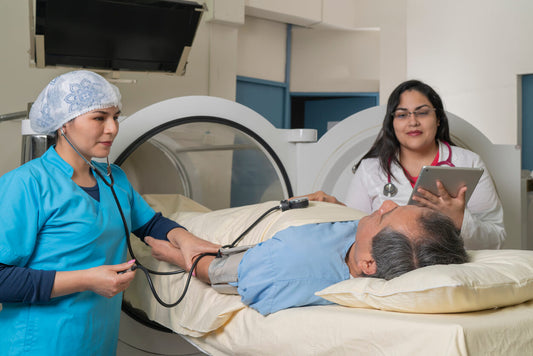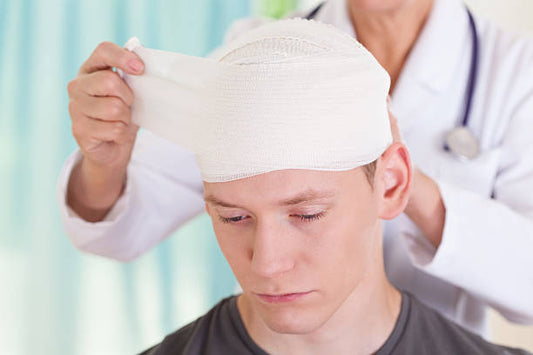Whether it's an accidental bump or a significant blow to the head, nobody benefits from getting hit in the head. Unfortunately, even the smallest head trauma can cause significant and lasting cognitive issues like memory loss, difficulty concentrating, mood changes, and even dementia. Some people don’t even realize they need brain injury help until it shows up later in life.
Concussions are more than a simple bump on the head. A 2023 study by Duke Health researchers found that a single traumatic brain injury (TBI), like a concussion, leads to a faster rate of cognitive decline later in life. Understanding the impact of your concussion could even help develop early treatments to delay or prevent dementia.
In Amen University's Concussion Rescue course, Dr. Kabran Chapek guides you through brain health rehabilitation techniques with comprehensive insight into natural concussion treatment options that work. You’ll learn practical steps to help you or your loved one recover from a concussion using natural and effective methods.
Understanding the Basics of Concussions
What Happens to Your Brain During a Concussion?
A concussion is a type of brain injury that occurs when the delicate gray matter of your brain is jolted or shaken inside the hard protective shell of your skull. This can happen due to falls, car accidents, sports injuries, or any blow to the head.
The brain's soft tissue becomes bruised, and the nerve fibers stretch or tear, leading to headaches, dizziness, confusion, and memory problems. There are five symptoms known to cluster when suffering from a concussion:
- Anxiety
- Depression
- Problems with focus and concentration
- Memory loss
- Anger and irritability
Though these symptoms are common in other mental conditions, they can point to much more serious and longer-lasting health issues.
H3. The Myths and Facts About Concussions
The Concussion Rescue course debunks common myths about concussions. For example, many people think you need to lose consciousness to get diagnosed with a concussion. In fact, concussions can occur even if you don’t black out.
Another myth is the belief that symptoms are temporary and resolve on their own. Unfortunately, without proper brain injury treatment and support, the effects can persist and even worsen over time.
Dr. Chapek provides a look into what actually happens to the brain during and after a concussion, emphasizing the need for proper diagnosis and treatment.
Practical Steps for Natural Concussion Treatment
Comprehensive Assessments: Understanding Your Brain Injury
Before choosing your concussion treatment options, it’s essential to thoroughly assess the extent of the brain injury. The Concussion Rescue course gives a detailed evaluation as the first step in concussion care. Dr. Chapek guides you through this concussion management program to have a clearer picture of the impact on specific areas of your brain.
Your TBI First Aid Kit
An essential part of your concussion management program is knowing what to do immediately following a head injury. The sooner you act, the better your outcomes to prevent debilitating fatigue, depression, anger, and a higher risk of dementia.
The Concussion Rescue course outlines how to create a TBI First Aid Kit that includes key items to support your brain's healing process.
You’ll even get a downloadable plan of action with specific anti-inflammatory supplements to maximize effectiveness. Having these essentials on hand and using them promptly can make a significant difference in your brain health rehabilitation techniques.
Nutritional Support: Feed Your Brain Well
One of the cornerstones of natural concussion treatment options is proper nutrition. The Concussion Rescue course breaks down what a brain-healthy diet looks like and its fundamental role in your recovery.
Dr. Chapek outlines specific brain-healthy dietary recommendations to repair brain cells and reduce inflammation. The course also highlights the benefits of avoiding inflammatory foods such as processed sugars and trans fats, which hinder concussion care and recovery.
Physical Activity: Gradual and Safe Movement
Physical activity is another important element in the concussion management program. However, it must be approached with caution to prevent exacerbating the brain injury. Dr. Chapek provides a step-by-step guide on how to safely reintroduce physical activity to rebuild physical stamina without compromising brain injury help.
The Concussion Rescue course also covers how to recognize signs of overexertion and adjust your activity level accordingly. It’s best to start with low-impact exercises like walking, gentle yoga, and mobility stretching to gradually increase intensity as symptoms allow.
Neurohormonal Support: It’s All About Balance
Research shows that between 25% to 50% of people who’ve suffered a head injury have damaged their pituitary gland—the master hormone gland in the brain. This means that concussions can disrupt the production of neurohormones that are critical for mood, energy levels, and overall brain function.
Imbalances in hormones like thyroid, testosterone, or estrogen may lead to depression, anxiety, low libido, and memory problems. That’s why supporting neurohormone production naturally is a key aspect of effective concussion care.
The Concussion Rescue course explains how these imbalances occur and provides practical steps to restore healthy neurohormone levels. This includes dietary changes, specific supplements, and stress-management techniques.
Mindfulness and Stress Reduction: Healing Through Calm
Stress significantly impedes your brain’s ability to heal from a concussion. Think about how often your brain forgets or falters when you’re under stress at work or at home.
Meditation, deep breathing exercises, and progressive muscle relaxation are methods with proven results recommended by Dr. Chapek. These practices specifically help reduce the stress hormone, cortisol, which interferes with the healing process.
Professional Support: Leveraging Expertise for Optimal Recovery
While natural treatments are highly effective, professional concussion support is indispensable for a comprehensive recovery plan. The importance of consulting healthcare professionals who specialize in brain injury support cannot be overstated.
Dr. Chapek discusses the benefits of working with neuropsychologists, physical therapists, and other specialists who tailor treatment and monitor progress. Combining natural methods with professional expertise means your recovery potential skyrockets.
Start Your Holistic Approach to Concussion Recovery
From anxiety and depression to brain fog and memory loss, many adults are dealing with the lingering effects of concussions from seemingly simple, everyday incidents. Implementing the concussion prevention tips and strategies in Amen University’s Concussion Rescue is your first step in immediate and long-term concussion recovery.
Whether you’re seeking brain injury treatment for yourself or providing brain injury support for a loved one, this course equips you with the knowledge and tools needed for effective and holistic concussion care. Start your Concussion Rescue course today and take the first step in reclaiming a healthier, stronger, and more resilient brain.

 Amen University
Amen University







